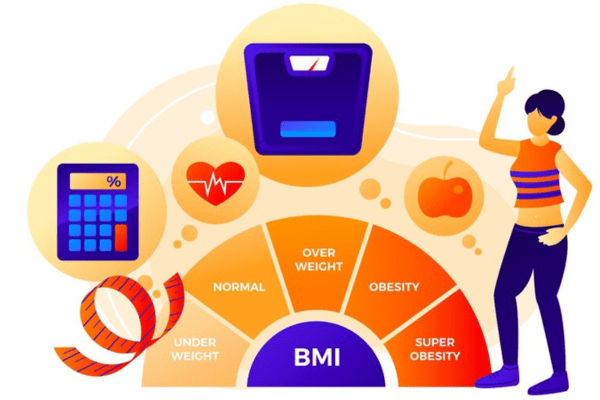Polycystic Ovary Syndrome (PCOS) is a common endocrine disorder affecting individuals of reproductive age. The condition is characterized by hormonal imbalances, irregular menstrual cycles, and the presence of cysts on the ovaries. Understanding the association between PCOS, Body Mass Index (BMI), and pregnancy is crucial for managing fertility-related concerns in individuals with PCOS.
- PCOS and BMI:
- Higher BMI and PCOS:
– Research indicates a notable association between PCOS and higher Body Mass Index. Elevated BMI is often linked to insulin resistance, a common feature in PCOS. Insulin resistance can contribute to hormonal imbalances, impacting ovulation and fertility.
- Impact on Hormonal Regulation:
– Increased adipose tissue in individuals with higher BMI can lead to excessive production of estrogen, affecting the delicate balance of reproductive hormones. This disruption can hinder regular ovulation, making it challenging for individuals with PCOS to conceive.
- PCOS, BMI, and Fertility:
- Reduced Fertility in Higher BMI Individuals:
– Studies suggest that individuals with PCOS and higher BMI may experience reduced fertility compared to those with a lower BMI. Weight management and lifestyle modifications are often recommended to improve fertility outcomes.
- Effect of Weight Loss on Fertility:
– Weight loss in individuals with higher BMI and PCOS has been shown to positively impact fertility. Shedding excess weight can improve insulin sensitivity, regulate hormonal levels, and enhance the chances of ovulation and conception.
- Pregnancy Complications:
- Higher BMI and Pregnancy Complications:
– Elevated BMI in individuals with PCOS can contribute to an increased risk of pregnancy complications, such as gestational diabetes, preeclampsia, and cesarean section. It’s essential for individuals with PCOS to manage their weight for a healthier pregnancy.
- Impact of PCOS on Pregnancy:
– PCOS itself may pose certain risks during pregnancy, including a higher likelihood of gestational diabetes and preterm birth. Close monitoring and proactive management are crucial to ensure a healthy pregnancy.
- Management Strategies:
- Lifestyle Modifications:
– Adopting a healthy lifestyle that includes regular exercise and a balanced diet is fundamental for managing both PCOS and BMI. Weight loss, even modest, can have significant positive effects on fertility and pregnancy outcomes.
- Medical Intervention:
– For individuals struggling with fertility due to PCOS and higher BMI, medical interventions such as ovulation-inducing medications and assisted reproductive technologies (ART) may be considered under the guidance of a fertility specialist.
Understanding the interplay between PCOS, BMI, and pregnancy is vital for individuals planning to conceive. Collaborating with healthcare professionals, including fertility specialists and obstetricians, allows for personalized guidance and a holistic approach to optimize fertility and promote a healthy pregnancy.
FAQs (Frequently Asked Questions) about PCOS, BMI, and Pregnancy
- Is there a connection between PCOS and Body Mass Index (BMI)?
– Answer: Yes, there is a notable association between PCOS and BMI. Higher BMI is often linked to insulin resistance, a common feature in PCOS. Managing weight becomes crucial for individuals with PCOS to enhance fertility and overall health.
- How does BMI impact fertility in individuals with PCOS?
– Answer: Elevated BMI in individuals with PCOS can contribute to hormonal imbalances, disrupting regular ovulation and reducing fertility. Weight management, including weight loss, has been shown to positively influence fertility outcomes.
- What role does weight loss play in improving fertility for individuals with PCOS?
– Answer: Weight loss in individuals with higher BMI and PCOS can improve insulin sensitivity, regulate hormonal levels, and enhance the chances of ovulation and conception. Lifestyle modifications, including weight loss, are often recommended for improving fertility.
- Are there increased risks during pregnancy for individuals with PCOS and higher BMI?
– Answer: Yes, individuals with PCOS and higher BMI may face increased risks during pregnancy, including gestational diabetes, preeclampsia, and a higher likelihood of cesarean section. Proper management and close monitoring during pregnancy are crucial.
- What are the recommended strategies for managing PCOS, BMI, and optimizing fertility?
– Answer: Lifestyle modifications, including regular exercise and a balanced diet, are fundamental for managing both PCOS and BMI. Weight loss, when needed, can positively impact fertility. Medical interventions, under the guidance of a fertility specialist, may also be considered for those struggling with fertility. Regular check-ups and collaboration with healthcare professionals are essential for optimizing fertility and promoting a healthy pregnancy.
For individuals navigating the complex intersection of PCOS and pregnancy-related concerns, seeking expert guidance is crucial. MotherToBe, under the expert leadership of renowned fertility specialist Dr. S. Vyjayanthi, offers comprehensive solutions and advanced reproductive care in India. Dr. Vyjayanthi’s extensive qualifications, including MD, DGO, DNB, MRCOG, MSC (Embryology UK), and CCT (UK), attest to her expertise in reproductive medicine and surgery. As the Director and Fertility Specialist at MotherToBe and the Head of Department & Consultant Fertility Specialist at KIMS, Secunderabad, Dr. Vyjayanthi leads a dedicated team committed to addressing the unique challenges of PCOS and optimizing fertility outcomes. For personalized care, cutting-edge treatments, and compassionate support during your PCOS and pregnancy journey, MotherToBe is a trusted destination under the guidance of Dr. S. Vyjayanthi.

